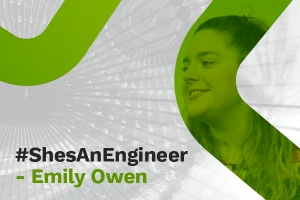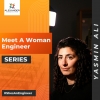She's An Engineer:
Emily Owen
Emily Owen is a Hydrologist with an Environmental Consultancy. Her focus is flood risk assessment work and surface water drainage design, many of which support planning applications, whilst some involve retrofitting for insurance purposes. With an appetite for acquiring new talents and diversifying her skill set, she has been developing her water management portfolio. Recently, she moved into mine water management and water resource modelling.
“Water management is as it sounds – in terms of a site, water comes in and out. If you get it wrong, you get flooded or run out of water – particularly at sites with high water use. Mine sites need to look at water use in depth. A lot of the time, they're in water-poor regions but use a huge amount of water. Water use now feeds into the ESG journey. Mining is probably one of the earliest industries to adopt ESG from a functionality and future-forward perspective.”
This work started for Emily at the very technical end, doing things like water balance modelling and looking at how water moved through mining systems and processes. Now, Emily is moving into water security and more sustainable water use.
The Engineering Idea?
Emily felt almost felt like engineering was not a choice, but where her studies and interests were always going to take her.
“Going into A-levels, I still loved physical Geography. I was getting frustrated by the end of A2 with Geography being a bit wishy-washy. I wanted to do the sciences behind it. I felt like I should be able to apply what I was doing in the other sciences to my Geography work. So I went and studied Science as an undergraduate. From there, the water element really interested me, so I did a Master’s in Hydrology and Water Resource Management within the Engineering department at Imperial. This brought me into the Engineering world and was probably the point that I realised that what I was doing was actually Engineering.”
Women Represented in Study
“I went to Durham for my Undergraduate course, which was probably male-dominated because it sat inside that traditional field of study like Geology. I went on an exchange for my second year. When I returned, I was free to do what I wanted because I wasn’t enrolled in a traditional course. You definitely got changes in the gender mix depending on which modules you took. The more environmental courses tended to draw in more women. Maybe because they're newer, less rigid and are constantly evolving.”
During her Masters, Emily reflects that females and multinationals predominantly represented the group and affirms that her overall study experience was positive. She felt well supported by other aspiring female Engineers throughout her studies.
Female Role Models and Representation
When discussing the outward-facing persona of a business and what people – particularly women or those from a diverse group – want to see reflected back at them, Emily agrees it’s not a board or interviewing panel of white middle-class men.
Reflecting on her personal experience with female Engineers and access to senior women or mentors in the industry, Emily shares that shehad a lot of strong male managers, but they’ve always been very comfortable with telling her to seek advice and support from other women where possible so that’s helpful.
“As our company has grown, we have more women in the office, which has helped to bring in more women. Having these female contacts on the bad days and having someone you can talk to is important. Sometimes you don't know if it's a discrimination thing or just a life thing. When you're the only person who meets the female criteria, you don't know the difference. Sometimes you just want to call someone up to cross-check it.”
Personal Experiences with Discrimination
“I’ve definitely had moments when I thought I’ve been discriminated against, but I do’'t know that’s been a clear-cut case. Some personality traits that have naturally been encouraged in me have made it difficult to tell. I will always offer somebody a cup of tea or coffee when they arrive somewhere because that’s what I'vebeen brought up to do. But then I found that I was always being asked to make the cups of tea even when I had a male colleague of equal status sitting next to me.”
Was Speaking Up an Option?
“Sometimes I would speak up, but that often made it worse because it made people feel defensive. I reached a point where I spoke to someone in the office and told them how it made me feel. They intercepted the requests and offered to make the drinks.”
Emily struggles to determine whether the issue was gender or personality based as it was clouded by the circumstance she had always offered in the past. Nonetheless, the request was always directed at her.
“It's a difficult one because we had no admin support. The truth is that 90% of admin staff are women. So, when you’re the young female in a room, the assumption is that you’ll make the tea. It was something that when I was more junior would really get me going.”
What can Schools in the UK do Better to Encourage People into Engineering or Other Expansive Careers?
“Encourage students to go out and look for things they haven’t thought of. There's a lot of information out there. Almost every profession in the UK has an institution that goes with it. They would love to do more with young professionals and students, but the gap between them is quite difficult. They can’t force themselves into a school environment, so maybe the solution is encouraging the interested kids to speak to these groups.”
What’s the Biggest Misconception About Engineering?
The practical misconception
“I think it’s what’s included in engineering. My preconceptions were people sat doing calculations and tapping away at a computer all day. But obviously, the job relates to so many other things. Particularly for graduates. A large proportion of it is site work where you’re out and about interacting with people. I don't think people realise this is a huge part of being an engineer.”
The gender misconception
“Some of the worst discrimination I’ve faced was while collecting bore water samples. A farmer approached me and asked, “What do you think you're doing young lady?” That phrasing, while quite common, makes you feel like you are five years old with your hair in pigtails. I’m obviously collecting a water sample, doing my engineering role, but there’s this whole misconception that you’re doing something you shouldn’t be doing because you’re a woman.”
When asked whether Emily felt this was a public misconception or if she felt the sentiment is echoed on site too, she shares, “I think you are treated differently some of the time. Partly because it’s a bit more unusual, and they don’t know how to interact with you. But I think some of it is a lack of provision for ladies coming to the site.”
Aside from less-than-ideal facilities, the provision of female-sized safety gear on site has also been an issue historically. According to Emily, this is getting much better. However, things often need to be made to order to accommodate the many variations of the female form.
There can often be a lag time of up to six weeks between placing an order and it arriving. These delays prevent female graduates from being able to get onto site as soon as they hit the workplace, limiting their real-world exposure in the initial stages of their careers. Ill-fitting gear makes it difficult to carry out your work comfortably but also lines you up to be the butt of someone’s joke. And whilst Emily acknowledges that humour and taking the mickey is effectively the love language on a site, it can also make the person on the receiving end feel a bit awkward, especially if this person is a young female graduate.
Finding the Right Opportunity
Women can make waves in engineering, and with strong women at the forefront of change, it’s important to know where to find the right opportunities. With the help of our team, you can find your next engineering role that’ll make you feel included and supported. Contact us today and learn more!
Additional Info
- Episode TitleShe's An Engineer






